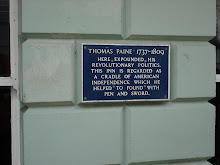
And so it came to pass. Saturday night saw us in the East Sussex village of Rottingdean with the Mummers Play peculiar to that place. Most villages in England had their own version of this traditional drama in years gone by. Folklorists such as the redoubtable Doc Rowe have made proper studies of this bucolic street (or to be more accurate) pub theatre and have amassed scores of different texts. The thread that joins them all together however is the age-old theme of death and resurrection but their origins are lost in a swirl of time and beer. Characters vary but are likely to include any or all of the following, or more - Father Christmas, The Prince of Wales (or any other monarch) A Soldier, Twing Twang (or any other ridiculously-named village idiot), The Doctor, A Turkish Knight, Little Black Jack or Beelzebub, and a Widow. I believe the purists call this a 'Hero Combat ' play but since I haven't Wikepedia'd it I couldn't comment one way or the other. What I do know is that the Rottingdean play was committed to paper by it's last surviving performer, my wife's grandfather, Jim Copper. Tellingly he wrote beneath the text, 'Faded out 1896'. He was right, too, for his contemporaries had either lost interest or the older players had died and Jim performed the whole play himself one last time in (I imagine) a sort of Tommy Cooper fast hat changing routine. As with his repertoire of songs, however, he was determined that the play wouldn't die, but it was a long delayed fuse that was re-lit in 1971 when various members of the family resurrected it and it's been going ever since. The veracity of the play is confirmed by Angel Thirkell, novelist and granddaughter of Burne-Jones who lived in Rottingdean. The play was traditionally performed in the pubs and the big houses around the village centre and she lived in three of them; in her book 'The Three Houses' she records the annual visit of the Mummers to her home, describing the mens uncomfortable shufflings and awkwardness, also the smell of sweaty corduroys after they'd left. Still, they'd picked up a few shillings in beer money from the wealthy and great. We now confine our 'performances' solely to two pubs in the village and one back at our 'Prince of Wale's' own establishment just up the road in New Anzac. This provides more than enough opportunity to become refreshed with Harveys best bitter and the sword fights, an intrinsic part of this jolly drama, become ever more daring and vibrant. The play concludes with our ringing the ancient Rottingdean handbells, the sight and sound of which is well worth the (non) price of admission, what with there not being quite enough bells, some of the clappers being missing and nobody possessing any skill whatsoever. This does not deter however and we make a brave, if confused stab at at least five carols. The audience, all valiant with ale themselves applaude rapturously as we tumble towards the welcoming bar for a fresh injection of the Lewes medicine. Having been killed for the third time this evening I am once more resurrected, and live, I sincerely hope, to fight another year.Christmas has finally arrived and through this ridiculously charming play we've been given a small glance into what passed for entertainment in years gone by. One thing's for sure...they had fun.



















